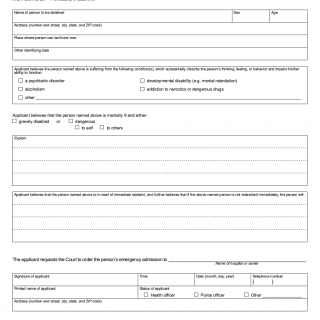Form 52744. Application for Emergency Detention of Mentally Ill and Dangerously or Gravely Disabled Person
The Application for Emergency Detention of Mentally Ill and Dangerously or Gravely Disabled Person (form number 52744) is a legal document used to request emergency detention for individuals who are experiencing a mental health crisis and who may be a danger to themselves or others. The purpose of the form is to provide a legal authorization for mental health professionals and law enforcement officers to take an individual into custody for an involuntary mental health evaluation.
The form consists of various parts, including identifying information about the individual, details about the mental health crisis, and information about the person making the application. Important fields on the form include the individual's name, address, and contact information, as well as details about their behavior or actions that indicate they may be a danger to themselves or others. The form also requires information about the person making the application, including their relationship to the individual and their contact information.
Parties involved in the form include mental health professionals, law enforcement officers, the individual experiencing the mental health crisis, and the person making the application for emergency detention.
When compiling the form, important information to include includes specific examples of the individual's behavior or actions that indicate they may be a danger to themselves or others, as well as any relevant medical history or diagnoses. Additional documents that may need to be attached to the form include medical records, police reports, and other relevant documentation.
Examples of application scenarios include situations where an individual is experiencing severe depression or anxiety, has been diagnosed with a severe mental illness, or is exhibiting dangerous behavior such as threatening violence towards themselves or others. The benefits of using this form include providing a legal and ethical framework for emergency detention, which can help protect individuals who may be in danger during a mental health crisis. However, challenges and risks associated with the form include potential infringement on individual liberties and potential misuse of the emergency detention process.
Related and alternative forms include various other legal documents used in mental health treatment, including informed consent forms, power of attorney documents, and advance psychiatric directives. The differences between these forms lie in their specific purposes, with the Application for Emergency Detention being used specifically for emergency situations where the individual is a danger to themselves or others.
The form affects the future of the participants by providing a clear legal authorization for mental health professionals and law enforcement officers to take individuals into custody, which can help protect their safety and wellbeing during a mental health crisis. The form is typically submitted to a mental health or law enforcement authority and is stored in an electronic or physical record system for future reference.

